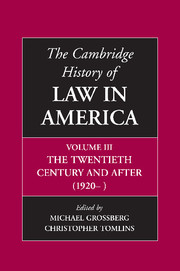Book contents
- Frontmatter
- 1 Law and the State, 1920–2000: Institutional Growth and Structural Change
- 2 Legal Theory And Legal Education, 1920–2000
- 3 The American Legal Profession, 1870–2000
- 4 The Courts, Federalism, and The Federal Constitution, 1920–2000
- 5 The Litigation Revolution
- 6 Criminal Justice in the United States
- 7 Law and Medicine
- 8 The Great Depression and the New Deal
- 9 Labor’s Welfare State: Defining Workers, Constructing Citizens
- 10 Poverty law and income Support: From the Progressive Era to the War on Welfare
- 11 The Rights Revolution in the Twentieth Century
- 12 Race and Rights
- 13 Heterosexuality as a Legal Regime
- 14 Law and the Environment
- 15 Agriculture and the State, 1789–2000
- 16 Law and Economic Change During the Short Twentieth Century
- 17 The Corporate Economy: Ideologies of Regulation and Antitrust, 1920–2000
- 18 Law and Commercial Popular Culture in the Twentieth-Century United States
- 19 Making Law, Making War, Making America
- 20 Law, Lawyers, and Empire
- Bibliographic Essays
- Notes on Contributors
- Index
18 - Law and Commercial Popular Culture in the Twentieth-Century United States
Published online by Cambridge University Press: 28 November 2008
- Frontmatter
- 1 Law and the State, 1920–2000: Institutional Growth and Structural Change
- 2 Legal Theory And Legal Education, 1920–2000
- 3 The American Legal Profession, 1870–2000
- 4 The Courts, Federalism, and The Federal Constitution, 1920–2000
- 5 The Litigation Revolution
- 6 Criminal Justice in the United States
- 7 Law and Medicine
- 8 The Great Depression and the New Deal
- 9 Labor’s Welfare State: Defining Workers, Constructing Citizens
- 10 Poverty law and income Support: From the Progressive Era to the War on Welfare
- 11 The Rights Revolution in the Twentieth Century
- 12 Race and Rights
- 13 Heterosexuality as a Legal Regime
- 14 Law and the Environment
- 15 Agriculture and the State, 1789–2000
- 16 Law and Economic Change During the Short Twentieth Century
- 17 The Corporate Economy: Ideologies of Regulation and Antitrust, 1920–2000
- 18 Law and Commercial Popular Culture in the Twentieth-Century United States
- 19 Making Law, Making War, Making America
- 20 Law, Lawyers, and Empire
- Bibliographic Essays
- Notes on Contributors
- Index
Summary
Over the course of the twentieth century, the commercial culture industry scanned nearly every nook and cranny of the U.S. legal system. Richard Sherwin spoke for many in the legal community when he complained, as the century ended, that law was in danger of going “pop.” Others, however, saw a much longer term and less corrosive relationship between law and commercial popular culture. By the close of the century, both law professors and academics from other disciplines were launching a new research project that identified multiple links between commercial pop culture and the formal field of law.
THE BIRTH OF THE “LEXITAINMENT” INDUSTRY, 1840–1960
The U.S. commercial culture industry, which emerged before the Civil War, quickly recognized the popular appeal of “things legal.” The penny presses of the mid-nineteenth century eagerly gravitated toward “notorious cases” involving prominent figures, especially politicians and ministers, or salacious legal scenarios, particularly murder and seduction. By the 1880s, tabloid-style newspapers stories, stage plays, and pamphlets (including those that simply reprinted trial testimony and lawyers’ arguments) entertained and informed a sizeable lay audience.
Writers of popular fiction also drew material from stories about a burgeoning criminal underworld. Early on, their work featured a theme that would repeatedly structure commercial representations of law: people looking at the legal system from the outside, it appeared, could invariably see issues, especially ones of guilt and morality, more clearly than the professionals who worked inside the machinery of the law. The pulp novels of George Lippard, such as The Quaker City (1845), portrayed a vast criminal underground in antebellum America that operated with legal impunity.
- Type
- Chapter
- Information
- The Cambridge History of Law in America , pp. 653 - 679Publisher: Cambridge University PressPrint publication year: 2008



